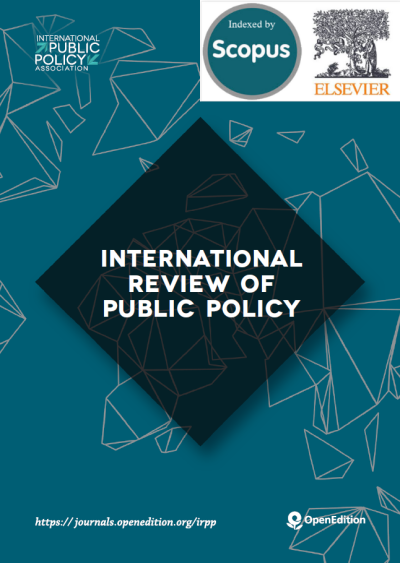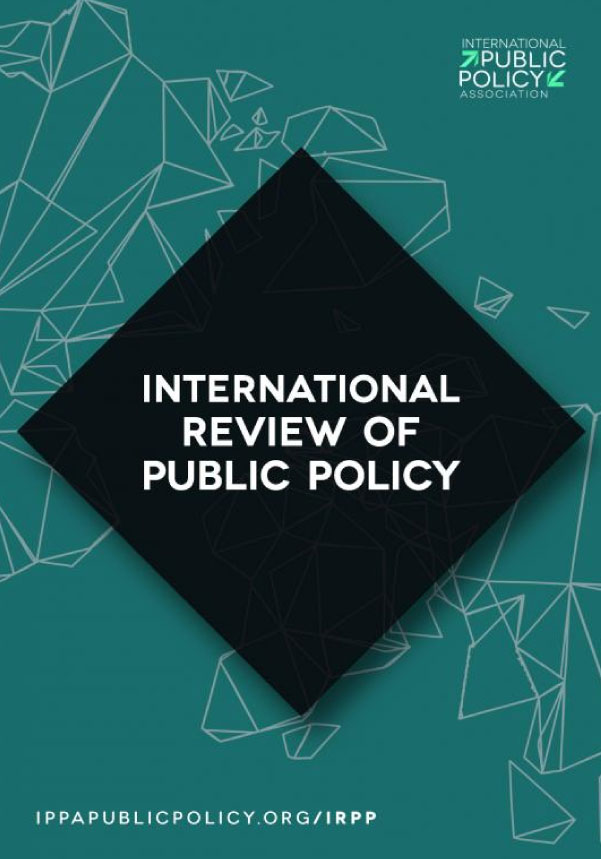Thank you for your message. The IPPA team will get back to you shortly. You first need to login here.

International Review of Public Policy
The International Review of Public Policy (IRPP) is an inclusive and integrative open-access journal free to its authors and readers. IRPP is the flagship journal of the most important worldwide association for public policy in the social sciences, the International Public Policy Association (IPPA). IPPA sponsors a fully Open Access IRPP. Our journal encourages and celebrates diversity and inclusion in authorship and in the selection of reviewers.
Our journal is dedicated to advancing knowledge about public policy in different policy sectors and national contexts. The journal hosts contributions advancing the scholarship on theories of the policy process, policy instruments, agenda setting, decision making, policy change, policy implementation, policy evaluation, and a host of other public policy relevant issues. IRPP welcomes both comparative work and single case studies. We accept submissions with a word limit of 10,000 words, including references, footnotes, tables, and graphs.
The IRPP is moving its submission platform to ScholarOne's Manuscript Central. For new submissions, please use the following link: https://mc04.manuscriptcentral.com/irpp
IRPP embraces methodological pluralism, accepting contributions based on qualitative, quantitative as well as mixed methods. IRPP does not discriminate against any ontological assumption. Finally, an important aim of the journal is to publish research that has high translation value – by this, we mean policy research that makes a broad range of findings available to policy-makers, civil society organizations, pressure groups and citizens concerned about policy issues.
The IRPP is inclusive and integrative:
Inclusive: Public policy is a diverse field. The IRPP reflects this diversity by supporting the broadest array of approaches. We welcome contributions that address public policy issues from different disciplinary traditions, empirical and theoretical approaches, methodologies that reflect different ontological and epistemological assumptions.
Integrative: The IRPP aims to be integrative by building bridges, making connections between different methodologies, and developing a common language between scholars. We also welcome contributions that make their research and ideas accessible to audiences different from academics.
In seeking to translate these two ideals into practice, IRPP does not discriminate against any ontological presupposition. All disciplines contributing to public policy are welcome, such as, to mention a few, ethnography, economics, political science, psychology, socio-legal studies and sociology.
The journal does not accept political/policy commentary, explanations of legislation and court decisions, and personal opinions.
All submissions go through rigorous double-blind peer review. Submissions to the journal undergo an initial editorial screening and, when a submission is considered appropriate, it is reviewed by at least two referees. The submission process is already open. The IRPP will also soon be launching an open peer review process for interested authors.
In addition to regular submissions, the journal will publish a Forum Section on debates and controversies about public policy studies.IRPP will publish four issues by year with 4 to 8 articles for each issue.
For further information, please contact us at the following address: irpublicpolicy1@gmail.com

Latest Issue 7(2) | 2025
Linda A. White, I Younan An, Elizabeth Dhuey and Michal Perlman
Selective Adoption or Comprehensive Learning? Domestic Policy Makers’ Use of International Organization and Global Management Consulting Firm Advice in Future Skills Policy Making in Canada
Alexandre Belloir, Richard Shaw and Caspar Van Den Berg
Bridging the Archipelago: Toward an Integrative Approach to Studying Bureaucratic Politicization
Andreea Năstase and Elissaveta Radulova
When Consultants Come to Town: How the European Commission Justifies the Involvement of Private Contractors in Online Public Consultations.
Marco Giuliani
Post hoc, propter hoc? Counterfactuals, placebos, and spillovers in evaluating a local mobility policy
Peter Hupe
Implementing crisis decisions beyond instructions: Lessons from implementation theory
Allegra H. Fullerton
Michael HILL & Peter HUPE, Implementing Public Policy (4th ed.)
Noe John Joseph E. Sacramento
Frank FISCHER, Critical Policy Inquiry: Interpreting Knowledge and Arguments





